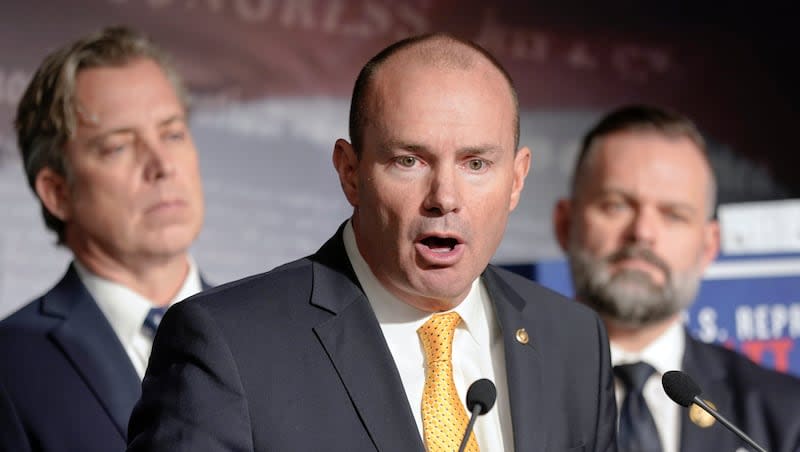Senate passes partial spending package of $460 billion and avoids another threat of shutdown

- Oops!Something went wrong.Please try again later.
- Oops!Something went wrong.Please try again later.
- Oops!Something went wrong.Please try again later.
The Capitol was abuzz Friday, following President Joe Biden’s fiery State of the Union address the night before, as senators advanced bills detailing $460 billion in government spending in a 75-22 vote. They now head to Biden for his signature.
Sen. Mike Lee voted against bills to bankroll government operations until Sept. 30, as he expressed frustration with earmarks attached to the bills. Sen. Mitt Romney voted to close debate on the bill but had to miss the final vote, according to his spokesperson.
The bills fund several federal agencies, including transportation, veterans affairs, energy, agriculture, and a few others, until Sept. 30.
“We will keep important programs funded for moms and kids, for veterans, for the environment, for housing, and so much more,” said Senate Majority Leader Chuck Schumer, D-N.Y., in a post.
This move comes after Congress has passed four stopgap bills in the last year to avoid a shutdown as House Republicans struggled to leverage their slim majority and come to an agreement with the Democratic-controlled Senate and White House.
Lee, R-Utah, and other lawmakers, expressed frustration over the blockage of Republican amendments to the “minibus” package on the Senate floor.
Some of the amendments introduced by Republican lawmakers included restricting migrants from being included in the census, deporting migrants for assaulting a police officer, and defunding sanctuary cities, as Lee noted in a post.
In a video message on X, formerly known as Twitter, he accused Democrats, joined by 14 Republicans, for bringing the debate to a close. This motion passed in a 63-35 vote Friday.
“We’ve now got up to 30 hours of post-cloture debate time when we continue to hammer out these reasons why the bill’s a problem, and why we’ve been improperly shut out of considering amendments designed specifically to undo the chaos and the carnage by the Democrats,” Lee said in the clip.
In January, House Speaker Mike Johnson, R-La., and Schumer agreed to a spending topline of roughly $1.65 trillion, incorporating $69 billion in adjustments as a part of a side deal, as the Deseret News reported. This large package, consisting of 12 spending bills, was divided into two parts with two separate deadlines: March 8 and March 22.
At a press conference on March 6, Lee said more than 6,000 earmarks worth at least $12.7 billion were tacked on to the bill. These directly allocated funds might go toward “good things that will benefit good people,” but he questioned whether it’s the federal government’s responsibility to fund specific projects without subjecting them to the “negotiation, discussion and amendment process.”
He said the package included earmarks like nearly $1 million to Georgetown University, Washington, D.C., a college with an existing $3.3 billion endowment, $850,000 to New Immigrant Community Empowerment, New York, for a new coffee shop and a greenhouse, and another $2.5 million for outdoor recreation, like kayaking, for a New Hampshire town.
Lee said he and other Republicans have tried to strike down these earmarks, only to be stopped by Appropriations Committee chairwoman Patty Murray.
On Wednesday, the House passed the appropriations package in a 339-85 vote through a fast-tracked process.
The House Freedom Caucus stood in opposition to the spending bills, pushing Johnson to make deeper cuts while accusing him of abandoning the Republican leverage and the priority of passing strict border reform, according to a press release.
Rep. Chip Roy, R-Texas, a Freedom Caucus member, wrote Monday on X the “minibus” is “littered with earmarks, fails to secure the border, (and) punts almost every GOP policy win.”
But Rep. Celeste Maloy, R-Utah, in a statement said she voted in favor of the bills because she thinks “it’s a good step toward a better budgeting process,” adding it isn’t “a 7,000-page omnibus package negotiated behind closed doors that no one has ever read.”
“Members were involved as these bills went through committee hearings and the amendment process over the last year,” Maloy said. “I hope that we can ultimately return to regular order where we vote on each spending bill separately. But for now, it’s time to pass the next package of spending bills and start working on the budget for fiscal year 2025.”
Utah Republican Reps. Blake Moore, John Curtis and Burgess Owens also voted in support of the minibus.

